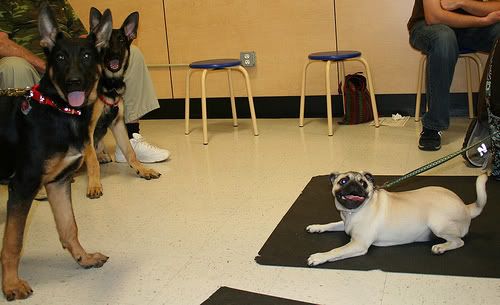
Puppy class photo by Ambie Bambi
In my career I’ve often tested new ideas long before they have become the norm. The challenge has always been to get others on board.
My local community lags behind the rest of the nation when it comes to animal care and training.
Personally, I like to get pups into training and socialization as soon as they arrive in the new household.
Granted, puppy training is a lot more difficult because puppies have the attention span of knats.
In some ways it is easier but in some ways it seems more difficult. However early puppy parenting pays off in the long run.
Unfortunately, most people still follow the pop culture trends of harsher training methods (which I find archaic) and waiting until an animal is an adolescent before they set down any ground rules.
Bad idea.
Who in their right mind waits to teach manners to adolescents?
Some of my colleagues and I conduct in-home private sessions with young pups and then do socializing in areas that pose less risk avoiding dog parks and high traffic areas where exposure to disease is higher.
We’ve used towels as stationing devices, devised covered or fenced areas in public venues, and met in disinfected clinics or pet stores.
My puppy socials always attracted a wide variety of breeds and ages. It is also a good way to teach owners how to manage their animals in a public setting and how to avoid the “dog park gone wild” situations that are becoming more and more prevalent in locations where there is no supervision.
Anyway, my point of this post is to let you know that I was happy to hear that the American Veterinary Society of Animal Behavior has taken a position on early socialization BEFORE the puppy vaccination series is complete.
The group agrees that early socialization should start as early as seven or eight weeks of age after they have a least one set of vaccines and a deworming.
To participate in a puppy social these procedures should be done a least a week (seven days) before the first class participation.
As most behaviorists and trainers know, there are critical developmental stages that take place from early puppyhood until about four months of age.
Not having early socialization can escalate phobias that include fear of people, other animals, objects, and different environments and substrates.
I am hoping that more veterinarians adopt to this “new thought” process. It can help prevent issues on the table and in the exam room if done right.
Many of my clients are assigned to go visit the veterinarian to get a pat and a cookie so that they have a better association with the clinic.
One of my clients proudly reported that her dog is the only well behaved animal in the waiting room. He also cooperates for every procedure.
Hopefully, those pups who present problems at an early age (growling and nipping for instance) can also get the schooling to prevent those problems from escalating.
Many of us believe that early pet parenting will help clients become more compliant and motivate them to continue those efforts that are benefit their pet.
If you are interested you can read the puppy socialization statement at the American Veterinary Society of Animal Behavior.

